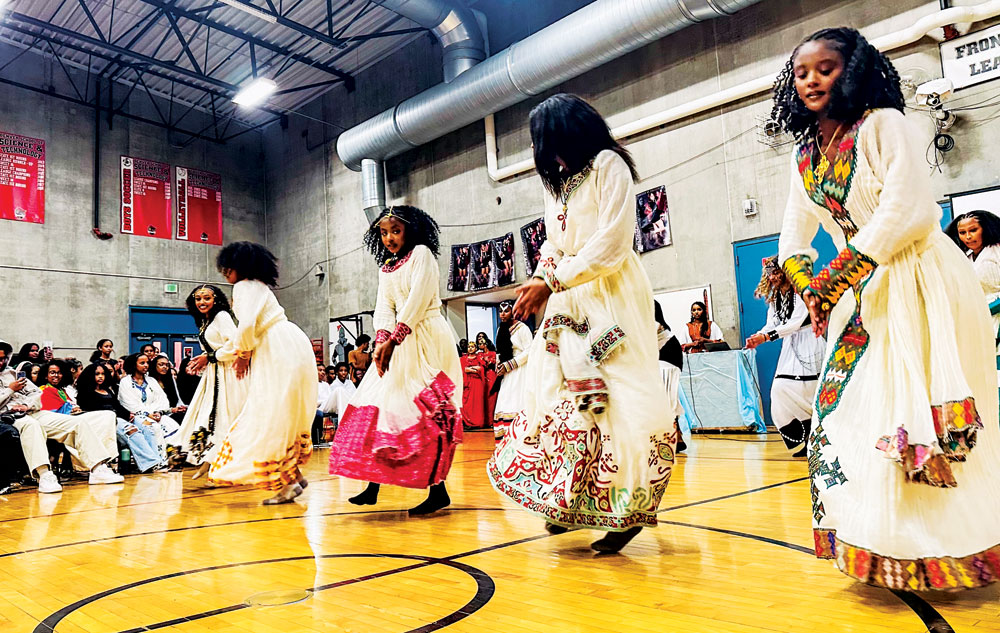
High school students from DSST: Montview perform traditional dances from their ancestral countries at an International Night celebration. The school’s population represents more than 30 different countries and languages, and the evening was filled with cultural performances, music, food, and clothing.
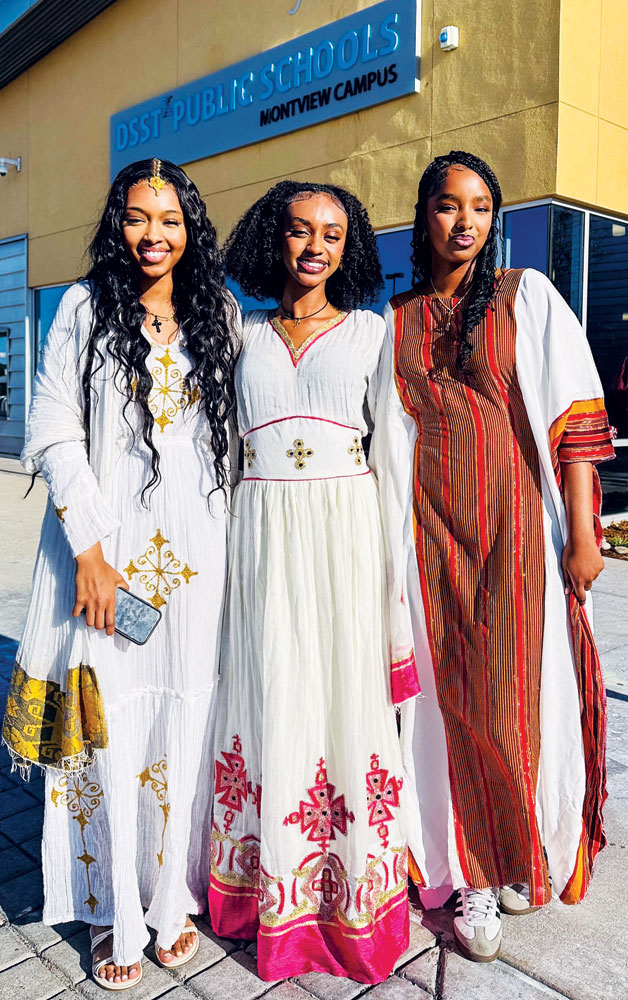
Left to right: Black Student Alliance members Meron Yohannes (Tigray region), Naomi Abraham (Ethiopia), and Sahuur Abdullahi (Somalia).
Students celebrated their graduation from one of Central Park’s most diverse schools with a multi-cultural party to the rafters. Literally. “It was important to us to make sure we had a flag hanging that represents the culture of every person in the school,” says graduating senior Naomi Abraham, who has family roots in Ethiopia. She and her fellow Black Student Alliance leaders coordinated the DSST: Montview International Night in May to “highlight all of our families,” she says. “Looking at all the food and clothes and proud parents, I feel even more proud of my culture.”
The food at International Night illustrated the cultural diversity fundamental to DSST: Montview. Cafeteria tables were laden with platters of injera, beef gyros, and baklava. Students, dressed in the traditional clothing of their respective cultures, scooped Jewish noodle kugel, Burmese fried rice, dal, and chow mein. Later, as seniors took to the stage to dance, sing, and present a fashion show of finery from around the world, coffee was served according to Ethiopian and Eritrean customs.
“There is very little that is more important today than learning to build community and connection across lines of difference,” says DSST: Montview high school director Lauren Reibstein. “Students and staff alike prioritize a sense of belonging,” which includes students representing more than 30 different countries and spoken languages. “We celebrate both the similarities between us and the parts that are different. We celebrate each other.”
At a time when Colorado is one of 19 states suing the federal Department of Education in response to a directive to eliminate Diversity, Equity, and Inclusion (DEI) practices in schools, DSST Public Schools and Denver Public Schools have responded by “doing the good things we’ve been doing,” says Tabitha Jones, a literacy interventionist at Swigert International School and the founder of Swigert’s own version of International Night. For Swigert’s event in May, students in kindergarten through fifth grade prepared food with ingredients from the school garden, made art and music, and memorized traditional dances, including a polka from the Czech Republic and a Mexican folk dance.
Second grade teacher Aarti Vipani draws on her training in classical Indian dance to choreograph a Bollywood-style number for Swigert International Night each spring. “The first year I taught Bollywood dancing, we had a few Indian students participate—those who knew what Bollywood was. “Now I have to put a limit on the group because more and more kids love the beats, the dancing, and want to join,” she says. Vipani appreciates seeing how exposing students to ideas has helped young people enjoy activities once unfamiliar to them. “In the very small part I play in the community, I’m happy to bring awareness,” she says. “I love when kids are singing along or teaching their friends the dances. They’re more knowledgeable about the world they’re in, and there’s more acceptance.”
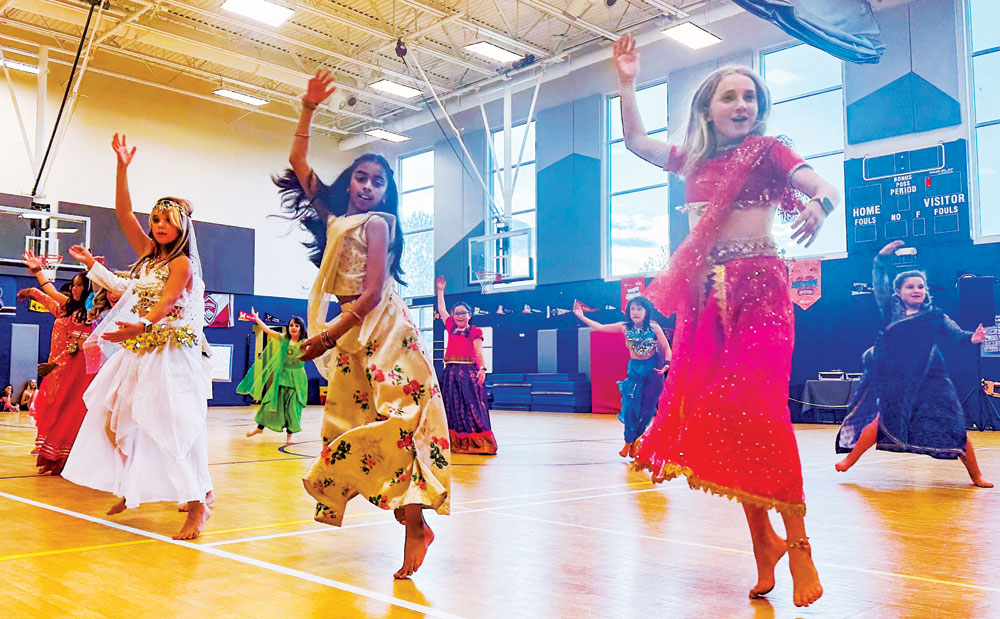
Teacher Aarti Vipani choreographed a Bollywood-style dance that Swigert International School students performed at their International Night in May.
At Northfield High School (NHS), junior Mozan Ahmed has likewise been on a journey to build acceptance “in a small way,” she says. Ahmed started the NHS Refugee Club last fall to bring together students like her, who are children of refugees or immigrants, and students who want to support them. She continues, “Small changes can lead to more and more little changes as more people become aware—and hopefully one day we’ll see a big change.” This year the club sponsored a clothing drive for refugees and packed food for a local relief program.
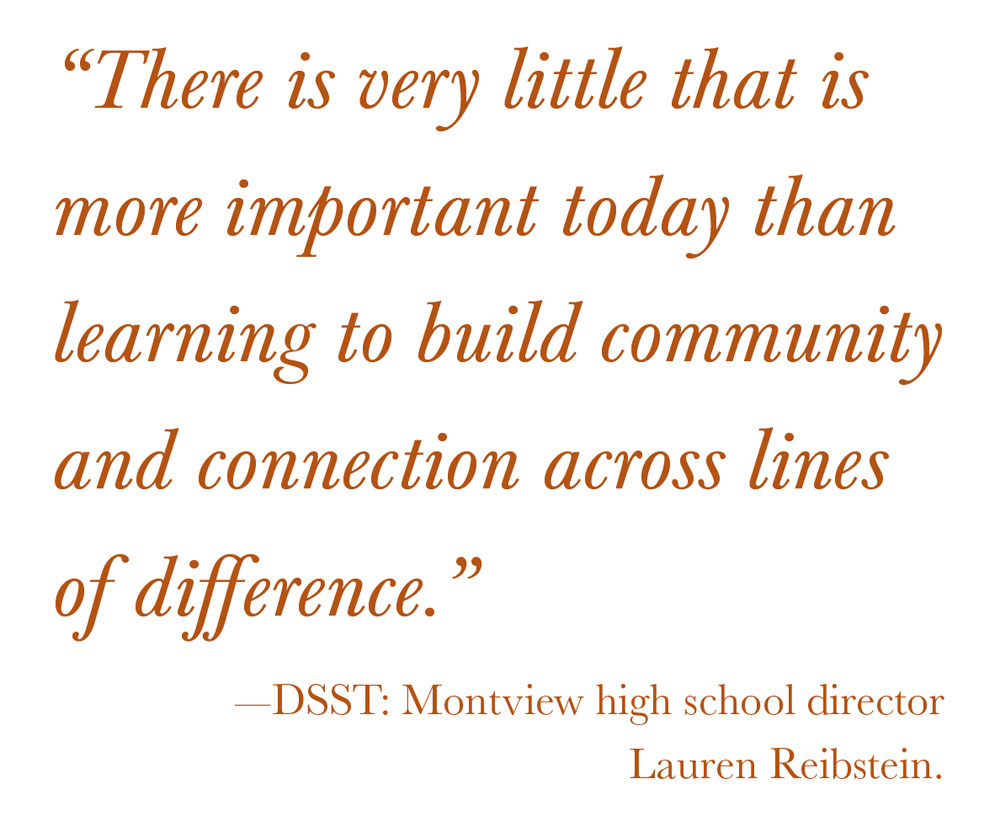 For some NHS students, acceptance and understanding begin in the classroom. DPS requires all students to take a semester of “Intro to Ethnic Studies,” taught at Northfield by Garrett Hayes. “The class is an opportunity to expand students’ minds beyond simple facts of history and beyond the dominant narratives in order to begin to understand multiple perspectives,” he says. As part of his effort “not to teach students what to think but how to think,” the culminating project for the class is a debate. Students are not told if they will be defending or arguing for their selected topic until the day of the event. “I want you to see the facts from both sides,” Hayes explains. “As a result, some students say, ‘I thought it was this, but now I’m seeing this.’”
For some NHS students, acceptance and understanding begin in the classroom. DPS requires all students to take a semester of “Intro to Ethnic Studies,” taught at Northfield by Garrett Hayes. “The class is an opportunity to expand students’ minds beyond simple facts of history and beyond the dominant narratives in order to begin to understand multiple perspectives,” he says. As part of his effort “not to teach students what to think but how to think,” the culminating project for the class is a debate. Students are not told if they will be defending or arguing for their selected topic until the day of the event. “I want you to see the facts from both sides,” Hayes explains. “As a result, some students say, ‘I thought it was this, but now I’m seeing this.’”
And at Inspire Elementary, fifth graders concluded the school year with what art teacher Caroline Weidner dubs an “identity project.” Students “learn about self-reflection, empathy, and the importance of diversity,” she says, as they plan and then paint a portrait of themselves in a way that portrays their unique identity. Weidner adds, “The conversations sparked by these portraits can lead to a more compassionate and inclusive community, which is essential in today’s diverse world.”
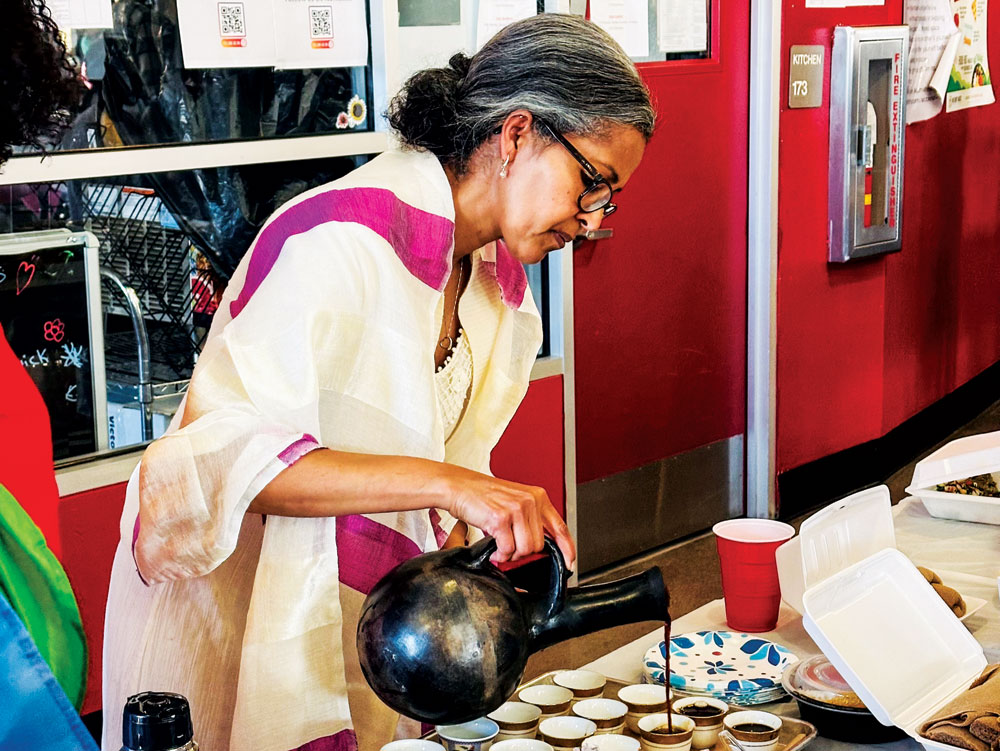
Eden Woldu pours Eritrean-style coffee at DSST: Montview.
Front Porch photos by Christie Gosch


0 Comments